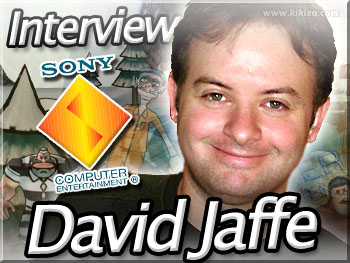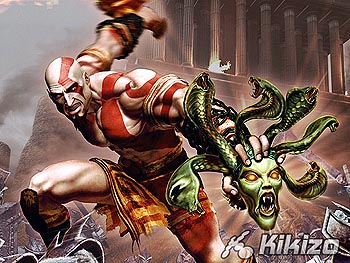David Jaffe Interview, May 2007
The creator of God of War talks to us about his new PS3 Network title Calling All Cars, getting his ass handed to him on the Internet, and what's next.
Page: 1 2
By Kikizo Staff
With the release of God of War a few years back, David Jaffe joined the big-name game creator superleague. Now, as Cory Barlog successfully takes on the series' legacy with the astonishing sequel, Jaffe's attention has turned to other vital parts of PlayStation - namely, titles for the PlayStation Network - revealed today in our detailed coverage.

The superb Calling All Cars is his first download-only title, available from the PlayStation Network service on PS3. During the recent Sony event that co-incides with today's Gamers Day in the US, we sat down for a video conference chat with Jaffe direct from his Santa Monica office - even the video chat was running on PS3.
![]()
Kikizo: Thanks for talking with us today about Calling All Cars. Was it a relief to take on a fairly small, cartoon-style, download-only project after your previous large-scale titles?
Jaffe: Relief is maybe not the right word. This sounds dorky, but it was a joy! It was so much fun to do a game that really was just about what I think makes games great, which is the interactivity; it wasn't about storytelling, it wasn't about cut-scenes, it wasn't about ambience - it was about what you do with the controller and what you do with your buddies when they have the controller. And I loved getting into the purity of that.
I got into games in 93 or 92, and I never got to work on those kind of games that I grew up playing and loving, with things like Pac-Man, Ms. Pac-Man, Asteroids, Battlezone, that really, because of technology, was all they could do! You know, and now I love the fact that with the PlayStation Network and Xbox Live Arcade, and PC download, as designers now we actually have the opportunity to sort of go back to what I think was a great era of gameplay, and try to maybe even build on it. So it was an absolute joy to do it.
Kikizo: Sure. So, were there challenges you faced in developing what's essentially a first-generation PlayStation Network title?
Jaffe: Well, there were certainly technical challenges that I can't speak to, because I'm not a technical guy, but yes certainly was that. As a game designer, I think the biggest challenge was with the realisation that we couldn't fall back on any of the tricks that we had used in the past, in terms of, "maybe here this gameplay's not so great, but let's show you a really cool camera move", you know, In God of War, or "this room isn't that exciting but in the next room we can make up for it."
In a game like Calling All Cars, or any kind of arcade game, if your core game isn't working, there's really nowhere to hide, because that fault - or that part of your game that's broken - travels with you over every aspect of the game, because there's only so much real estate and you're always in the game. So that I think was the biggest challenge, and the biggest thing to learn and take forward with out future PlayStation Network games, that you're pretty much naked with these things, and you better play your A game, or players are gonna know, and within a few minutes you're pretty much screwed. So it's fun, but it's harder.
Kikizo: We've been playing Calling All Cars, and I have to say, we love it - but one thing that's struck me about it is that playing in singleplayer, the AI is pretty harsh - you have to really work quite hard to get through it, was that intentional?
Jaffe: Well... no. We focus tested the crap out of it because we didn't want to make the game too hard, and apparently what we did - and I don't know if this is the only problem you found, or if it was a problem at all, for you - but we saw a number of early American reviews, where they were complaining about the AI with the magnet, and the sort of overwhelming power that the AI had when they used the magnet.
So, we had to go back into the game and correct some bugs anyway, we went back in... we didn't change the multiplayer, which from what we got from our early reviews, everyone was a really big fan of, but on the singleplayer, we toned down the AI ability to sort of suck the criminal out of your car using the magnet. And we also, I think we may also have toned down a little bit of the difficulty in the default mode. So we did some changes to fix that. I don't know if that will fix your issues with it, but certainly with that we put something out there that, at least in default mode, most players can get through.
And that's the hard part too, because when you focus test it you don't know who your audience is, right, I mean we bring in people who are focus testers who are obviously interested in videogames. And so we watch them play the game in default mode - and this is before we fixed the magnet - and these guys would be able to get through the game in like 25 minutes. And we're like, OK, some maybe the game's tuned OK. You know, and then it's like, you know, PlayStation 3 is still a relatively expensive purchase, the assumption is people who have a PlayStation 3 can kind of hang on to the title of a gamer, and so we kind of looked at where on the spectrum of hardcore do they sit? So, it was a real challenge to figure out, who are we tuning this singleplayer for?
Kikizo: Yeah, we were playing of quite old code. So also, was Wacky Racers an influence? Because that's what it really reminds me of...
Jaffe: It... no, but R. Crumb was an influence, the cartoon artist [Robert] Crumb, did a lot of underground comics back in the 50s and - he still does comics - but originally it was not going to be cutesy family game, it was gonna be more of an X-rated, kind of cartoon Ralph Bakshi kind of thing, and for a number of reasons we ended up moving away from that; one was a gameplay reason, one was that we had some issues on the team where the guys didn't know I wanted to take it that far, and we were like let's just go with what we've got. It wasn't a battle or a fight, ultimately it wasn't that important, but Wacky Races is a little benign for where this actually started at, which was much more X rated.
Kikizo: So what behind the name change from the concept name, Criminal Crackdown, to this final name?
Jaffe: It was basically... legal came back to us and said we couldn't use Crackdown. And they never said this, but the assumption was that it was because Microsoft had this game Crackdown on their Xbox. And I always... legal's great, because you know, they watch out for us, and nobody wants to end up in court, nobody wants to get sued. But for me, that was a little bit of a stretch, like, Criminal Crackdown; Crackdown; I think people will be able to tell the difference.
But they were like, you know, for us - it's their company - for us it's a little too close, and so we knew that we couldn't use Criminal Crackdown, and so we started searching for something else, and one of the designers said, "Calling All Cars!" and I said, yeah, that's cool.
Page: 1 2













 Satoru Iwata Video Interview - the late Nintendo president spoke with Kikizo in 2004 as 'Nintendo Revolution' loomed.
Satoru Iwata Video Interview - the late Nintendo president spoke with Kikizo in 2004 as 'Nintendo Revolution' loomed. Kaz Hirai Video Interview - the first of Kikizo's interviews with the man who went on to become global head of Sony.
Kaz Hirai Video Interview - the first of Kikizo's interviews with the man who went on to become global head of Sony. Ed Fries Video Interview - one of Xbox's founders discusses an epic journey from Excel to Xbox.
Ed Fries Video Interview - one of Xbox's founders discusses an epic journey from Excel to Xbox. Yu Suzuki, the Kikizo Interview - we spend time with one of gaming's most revered creators.
Yu Suzuki, the Kikizo Interview - we spend time with one of gaming's most revered creators. Tetris - The Making of an Icon: Alexey Pajitnov and Henk Rogers reveal the fascinating story behind Tetris
Tetris - The Making of an Icon: Alexey Pajitnov and Henk Rogers reveal the fascinating story behind Tetris Rare founders, Chris and Tim Stamper - their only interview? Genuinely 'rare' sit down with founders of the legendary studio.
Rare founders, Chris and Tim Stamper - their only interview? Genuinely 'rare' sit down with founders of the legendary studio. The History of First-Person Shooters - a retrospective, from Maze War to Modern Warfare
The History of First-Person Shooters - a retrospective, from Maze War to Modern Warfare